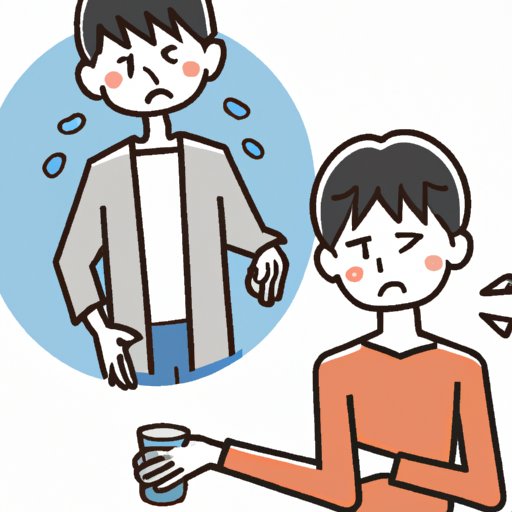
Introduction
Alcohol consumption is a part of socializing, celebrating or enjoying leisure time for many people. However, excessive drinking can lead to unpleasant symptoms such as headaches, nausea, and vomiting. Throwing up after drinking alcohol is a serious issue, but fortunately, there are solutions to prevent and handle it. This article will guide you through the steps you can take to stop throwing up after drinking.
Preventative Measures Before Drinking
One of the best ways to avoid vomiting after an alcoholic drink is to take measures before consuming alcohol. A few preventative measures are described below that can help you manage the symptoms.
Eat a full meal beforehand
Eating a full meal before drinking is a great way to avoid vomiting. A full stomach slows down alcohol absorption into the bloodstream, helps reduce nausea, and prevents hangovers. Foods rich in protein and complex carbohydrates like eggs, cheese, or pasta are an excellent option.
Hydrate with water or sports drinks
Dehydration can be a major contributor to vomiting after drinking. It is recommended to hydrate with water or sports drinks to prevent dehydration. Drink at least eight to twelve ounces of water or sports drink before bed.
Avoid consuming alcohol on an empty stomach
Drinking alcoholic beverages on an empty stomach can lead to severe vomiting. It’s necessary to consume food before drinking to maintain blood sugar levels and reduce alcohol absorption.
Pace drinking and don’t overdo it
Pacing drinking is a crucial aspect of preventing vomiting after drinking. Consuming small amounts of alcohol at a time can help you enjoy the night without throwing up. Overdoing it can lead to losing control of your body.
Staying Hydrated While Drinking
Staying hydrated while drinking is an important factor in avoiding vomiting and other symptoms. Below are some precautions to help you maintain hydration levels.
Alternate alcoholic beverages with non-alcoholic ones
Alternating alcoholic beverages with non-alcoholic ones can help you manage alcohol consumption and maintain hydration levels. Non-alcoholic drinks like water, fruit juice, or soda can help replace the fluids lost during alcohol consumption.
Drink water in between drinks
Drinking water between alcoholic drinks is an effective way to prevent vomiting. It helps dilute alcohol levels, and your body’s cells stay hydrated.
Avoid sugary or carbonated drinks that will dehydrate you further
Sugary and carbonated drinks can worsen dehydration and lead to vomiting. Drinks like soda, tonic water, and energy drinks can cause discomfort and irritation to your stomach lining.
Mitigating Nausea
Nausea can be a significant contributing factor in vomiting after alcohol consumption. Below are some remedies that can help mitigate nausea symptoms.
Drink ginger tea or take ginger supplements
Ginger tea or supplements can help soothe your stomach and reduce nausea and vomiting. Taking an anti-inflammatory supplement before drinking can also help prevent nausea.
Take over-the-counter medication specifically for nausea
Over-the-counter medication for nausea and vomiting such as Pepto-Bismol can help reduce nausea symptoms. However, taking them before drinking is more effective.
Avoid greasy or spicy foods that will upset your stomach
Greasy and spicy foods can irritate your stomach and exacerbate nausea, making you feel more sick. Therefore, it is important to avoid these foods before or after drinking alcohol.
Relieving Hangover Symptoms
Hangovers are a common and unpleasant occurrence after a night of drinking. Below are some remedies that can help relieve hangover symptoms like headaches or body aches.
Drink electrolyte-rich fluids like coconut water or sports drinks
Drinking electrolyte-rich fluids like coconut water can help replenish lost fluids, restore energy levels, and reduce the effects of a hangover.
Take aspirin or ibuprofen to ease headache and body aches
Aspirin or ibuprofen can help relieve headache and other aches associated with a hangover. However, taking these medications with alcohol may result in further damage to your stomach.
Get plenty of rest and sleep
Resting and sleeping after drinking is essential for allowing your body to recover and recuperate. It’s highly recommended to get enough sleep after a night of drinking to prevent or mitigate hangover symptoms.
Addressing Underlying Issues
Various underlying issues can lead to excessive drinking and, ultimately, vomiting or other symptoms. Below are some suggestions on how to find solutions.
Discuss the effects of anxiety, depression, and other mental health issues on alcohol consumption
Anxiety, depression, and other mental health issues can be significant factors in alcohol consumption. Discussing these issues is essential in preventing and mitigating vomiting and other alcohol-related symptoms.
Offer advice on how to seek professional help if alcohol consumption is becoming too frequent
For people who struggle with maintaining low alcohol consumption, seeking professional help can be a great and practical solution. Encouraging such individuals to seek professional help can lead them to help them better manage their alcohol consumption.
Dos and Don’ts for Alcohol Addiction
Alcohol addiction is a serious matter that must be addressed. Below are some dos and don’ts for managing alcohol addiction.
Encourage readers to seek treatment and support groups if they’re struggling with addiction
Treatment and support groups, such as Alcoholics Anonymous or therapy groups, are a good option for people who have alcohol addiction. Encouraging them to seek help can help manage and regain control of their lives.
Mention common triggers that can lead to excessive alcohol consumption
Some common triggers, such as stress and anxiety, can lead to excessive alcohol consumption. These triggers can be kept in check through stress-reducing techniques or other stress management methods.
Conclusion
In conclusion, vomiting after drinking alcohol is a serious issue that must be handled with care. In this article, we have discussed various preventative measures, remedies, and long-term solutions to help prevent and mitigate vomiting and other alcohol-related symptoms. We hope that readers will consider taking a proactive approach to drinking and that they prioritize their health.





